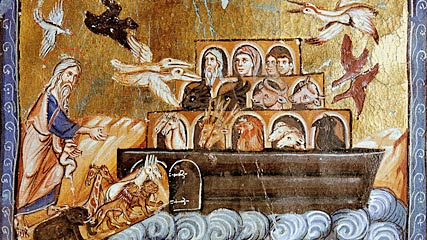Thursday, April 10, 2014
Stump the Priest: Noah's Flood
Question: "Was the whole world actually flooded in Noah's flood, or were just parts of it flooded? Does it matter? I went back to read the story but I wonder have the translations from the Greek been lost or misinterpreted? How are we to think of the story of Noah?"
There are conservative Protestants who have laid out detailed arguments that the flood of Noah was a universal flood, and explain how it could have happened. As interesting as some of their theories are, I would not want to have my faith in God rise or fall on them.
There are also many who argue that the flood was a regional flood. In Hebrew, the word that is translated as "earth" in the flood narrative is either "eretz" (which means "land", and can mean either a local area, such as the land of Israel, or the whole earth), or "adamah" (which means "ground," or "soil") -- and so neither word necessarily suggests the entire earth is in view. In recent years this view has been bolstered by evidence of a flooding of the Black Sea area, and evidence that a very large area of land under the black sea was once inhabited by humans, and this is also relatively near to Mount Ararat, where the Bible says the Ark came to rest.
It is also noteworthy that there are flood stories in almost every culture. Sometimes this is cited to discredit the Genesis account, and to argue that the story of Noah is just one of many, but if there was a great flood that affected all of mankind, then you would expect to find such stories in every culture. In fact many of these accounts have striking parallels with the account in Genesis. For example, in addition to having flood legends, the Chinese character for a ship is a boat with eight mouths on it::
And of course, the Ark had Noah, his wife, his three sons, and their wives -- a total of eight persons.
Since we cannot go back in time to observe what happened, we can only look at the evidence, and speculate as to what actually happened. However, as Christians we know that the Scriptures are inspired. We know that in whatever sense the flood narrative in Genesis was intended to be taken, it is true. We should then focus on the theological, spiritual, and moral meaning of the flood narrative, and not worry about how to explain what actually happened... because, what scientists think they know about the history of the world today is not what they knew 100 years ago, and no doubt it will not be what they will know in another 100 years. These are interesting questions for scientists, and it is interesting for laymen to study these questions, but that is not what the story in Genesis is trying to teach us. We should focus on what the story means for us, as believers, and we should not feel as if we have to settle these questions to trust the Scriptures.

